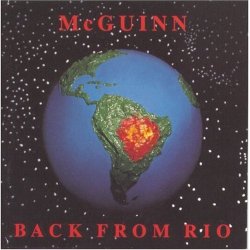| Back from Rio | ||||
|---|---|---|---|---|
 | ||||
| Studio album by | ||||
| Released | January 8, 1991 | |||
| Recorded | Capitol (Hollywood) | |||
| Genre | Rock | |||
| Length | 41:44 | |||
| Label | Arista | |||
| Producer |
| |||
| Roger McGuinn chronology | ||||
| ||||
| Alternative cover | ||||
 Cover of European release | ||||
| Singles from Back from Rio | ||||
| ||||
| Review scores | |
|---|---|
| Source | Rating |
| AllMusic | |
| Entertainment Weekly | B [2] |
| The Great Rock Discography | 6/10 [3] |
| MusicHound | 2/5 [4] |
| Orlando Sentinel | |
| Rolling Stone | |
Back from Rio is the sixth studio album by American singer-songwriter,guitarist and co-founder of the Byrds Roger McGuinn. It was released on January 8,1991,more than a decade after McGuinn's previous solo album, Thunderbyrd . [7] The album was issued following the release of the Byrds box set and musically it leans on the sound of the Byrds thanks to McGuinn's ringing 12-string electric guitar and vocal contributions from ex-Byrds members David Crosby and Chris Hillman. Also prominent on the album are Tom Petty and the Heartbreakers,with Petty co-authoring and duetting with McGuinn on the album's lead single "King of the Hill". In addition,several members of the Heartbreakers provide musical backing on a number of the album's tracks. Other prominent songwriters on the album—besides McGuinn and his wife Camilla—are Elvis Costello,Jules Shear and Dave Stewart of the Eurythmics.
Contents
- Track listing
- Side one
- Side two
- Personnel
- Production
- Charts
- Weekly charts
- Year-end charts
- References
The album was generally well received by music critics and it peaked at No. 44 on the Billboard 200 album chart. [8] Two singles were drawn from the album:"King of the Hill" and "Someone to Love",which peaked at No. 2 and No. 12 on the Billboard Hot Mainstream Rock Tracks chart. [9]
In Europe,Back from Rio was released in February 1991 [7] and featured different cover artwork.